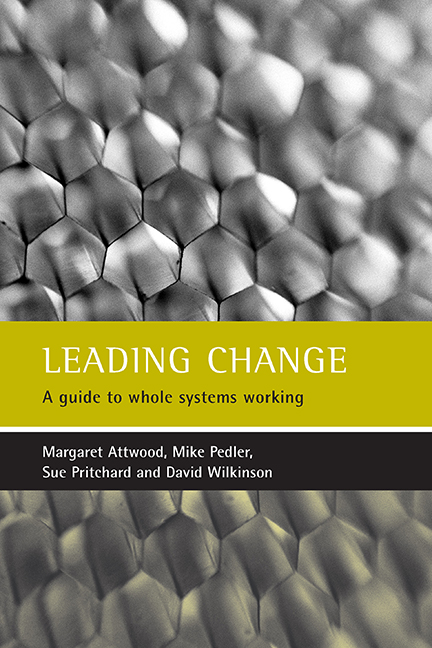Book contents
- Frontmatter
- Contents
- Foreword
- Foreword
- Prologue
- one Why do we need whole systems change?
- Two How Do We Put These Fine Words Intoaction? An Overview of Whole Systems Development
- Three The emerging practice of wholesystems development
- Four Leadership: keeping the big picture in view
- Five Public learning
- Six Valuing difference and diversity: getting the whole systeminto the room
- Seven Meeting differently: large and small group working
- Eight Follow-through and sticking with it
- Nine From organisations to networks
- Ten Confirming cases: local problems andlocal solutions within whole systems
- Epilogue
- Bibliography
- Index
Nine - From organisations to networks
Published online by Cambridge University Press: 20 January 2022
- Frontmatter
- Contents
- Foreword
- Foreword
- Prologue
- one Why do we need whole systems change?
- Two How Do We Put These Fine Words Intoaction? An Overview of Whole Systems Development
- Three The emerging practice of wholesystems development
- Four Leadership: keeping the big picture in view
- Five Public learning
- Six Valuing difference and diversity: getting the whole systeminto the room
- Seven Meeting differently: large and small group working
- Eight Follow-through and sticking with it
- Nine From organisations to networks
- Ten Confirming cases: local problems andlocal solutions within whole systems
- Epilogue
- Bibliography
- Index
Summary
Very little is accomplished now by the single organisation acting alone. Most organisations need business partners; not only horizontally, in alliances, supply chains or joint ventures, but also vertically around relationships with users andcustomers. The organisational life cycle is shorter than it was; organisations are founded, mature and die off with increasing speed. In seeking to respond to change and complexity, everyone must ‘spread their bets’; have multiple options and consider more futures. Moreover, the futures of more organisations are tied to the desires and ambitions of users and consumers in their communities and neighbourhoods.
The single organisation, traditionally the site for organisational development efforts, is no longer an adequate unit of analysis. It cannot embrace the connections and relationships needed for the way in which products and services are now designed, developed, produced and delivered. This is especially so when tackling innovative solutions to intractable problems, the ‘wicked issues’,and in moving to more preventative and sustainable outcomes. The network, including the notions of value chain or supply chain, alliances and partnerships,is the new organisational form of the 21st century, while network organising is the new skill to be mastered by leaders and managers.
This is particularly true of public services. Although, as noted earlier, whole systems development (WSD) is not limited to this field of endeavour, the complexity and paradoxical tensions found here make it a natural site for this way of working. As Revans has observed, these tensions cannot be resolved by simple applications of science or system, and their resolution in particulardemands the involvement of service users:
But, whatever our theoretical powers, the systems we need in order to understand the public services are not to be found in the libraries and computing rooms of universities. If they are to be found at all, it will be in such social laboratories as the back streets of Gateshead, and it is there thatwe shall need to learn how to work. Our problem at the moment is to getourselves invited. (Revans, 1975, p 492)
Whole systems development fits an era when organisational boundaries areloosening and becoming more complex and problematic. In giving voice tothe many different interests and motivations making up an organisational fieldof activity, WSD builds on the earlier organisation development (OD) andlearning organisation approaches.
- Type
- Chapter
- Information
- Leading ChangeA Guide to Whole Systems Working, pp. 143 - 162Publisher: Bristol University PressPrint publication year: 2003



